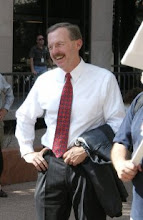
Tuesday, June 2, 2009
Former Boeing Engineer Goes to Trial on Espionage Charges
Dongfan 'Greg' Chung provided Space Shuttle secrets to China, federal prosecutor says.
By Rachani Srisavasdi
THE ORANGE COUNTY REGISTER
SANTA ANA – A former Boeing engineer betrayed the United States by providing confidential information about the Space Shuttle program to the People's Republic of China, a federal prosecutor said in opening statements Tuesday.
"Information, security and betrayal," Assistant U.S. Attorney Greg Staples said in the trial of Dongfan "Greg" Chung. "These are the three pillars of the government's case."
The defense attorney for Chung – a 73-year-old grandfather who resides in Orange – countered that his client refused Chinese officials' overtures to reveal classified information on military and space technology secrets.
"So much of this evidence is (about) what my client didn't do," Thomas Bienert Jr. said. "It makes him a non-spy. … People were trying to get him to give him things."
Chung was arrested in February 2008, after an unsealed indictment accused Chung of giving secrets to China since the late 1970s. He is charged with ten counts, including six of economic espionage, as well as acting as an agent for the People's Republic of China.
The case comes two years after the conviction of another former Orange County engineer, Chi Mak, on charges of exporting sensitive defense technology to China.
Mak, who was sentenced to 24 ½ years in prison, knew Chung. In fact, federal agents interviewed Chung during the Mak investigation. During a September 2006 interview, Chung said he met Mak around 1980 at a meeting in Los Angeles organized by a Chinese organization, FBI Agent Kevin Moberly said during his testimony Tuesday.
"He told me he suspected Chi Mak was providing sensitive information to China,'' said Moberly, the trial's second witness.
Agents also found information in Mak's home about Chung, prosecutors said.
During a search of Mak's home in June 2006, a letter was found from a senior aviation official in China. That missive, dated May 2, 1987, was addressed to Chung and asked him to provide information on airplanes and the space shuttle, according to prosecutors.
Chung, who has been out on bond since his arrest, listened intently to the first day of testimony. His wife sat in the courtroom gallery's back row and took notes. The couple's two sons did not attend the proceedings.
Chung, a naturalized U.S. citizen, was born in China in 1936 and moved to Taiwan in 1948, according to the government's trial brief. He came to the United States in 1962, and got a master's degree at the University of Minnesota, and was later hired by Boeing, prosecutors said.
For most of his career, Chung worked as an analyst on the fuselage section of the Space Shuttle, according to prosecutors. He moved to Southern California in 1973, when he was employed by Rockwell in Downey, prosecutors said. Rockwell was acquired by Boeing, and in 1999, Chung moved to Boeing's plant in Huntington Beach, according to prosecutors.
He was laid off by Boeing in 2002 but worked there until 2006 on a contractual basis, they added.
Federal agents found a quarter of a million documents at Chung's home – information from Rockwell, Boeing and other aerospace companies, according to Moberly's testimony.
"There is no question the defendant worked for the Chinese government," Staples said during opening statements.
During his opening statement, Bienert explained the information was in Chung's home because Chung was a "pack rat,'' who held onto all information.
"With all respect to my client, his house gives new meaning to clutter,'' said Bienert, as photos of Chung's home – filled with stacks of paper and clutter – flashed on television screens.
The defense attorney did acknowledge Chung provided some information about technology to officials – but only information already out in the public domain.
Chung, he explained, "was committed to trying to see China become more part of new millennium."
He also questioned the freshness of the government's case, citing letters from the 1980s between Chung and Chinese officials.
The statute of limitations had run on any potential criminal activity by Chung, he added.
The bench trial is being heard by U.S. District Judge Cormac Carney, who presided over the Mak case. It is expected to last about two weeks.
###
Comment -- A glimpse at Chung's possible motivation(s):
- Chung indicated to his PRC handlers a desire to contribute to the “motherland.”
- "I don't know what I can do for the country. Having been a Chinese compatriot for over thirty years and being proud of the achievements by the people's efforts for the motherland, I am regretful for not contributing anything.....I would like to make an effort to contribute . . . "




No comments:
Post a Comment